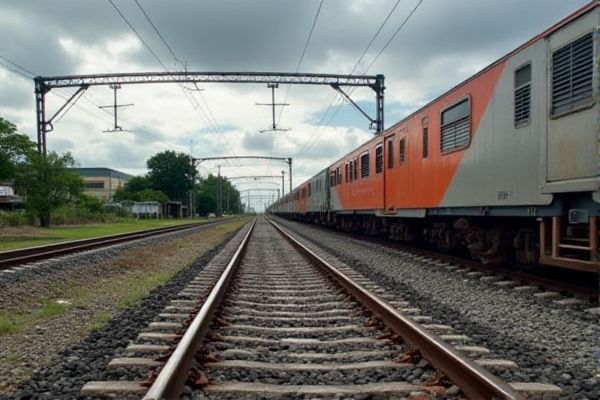
The Philippine railway sector is experiencing significant growth, driven by government initiatives and infrastructure projects aimed at enhancing transportation. Opportunities arise in various roles, including engineering, operations, and project management, catering to a range of skill sets. Companies are seeking candidates with expertise in railway design, maintenance, and safety protocols to meet increasing demands. Training programs and partnerships with educational institutions are also expanding to prepare the workforce for emerging roles in this vital industry.
Job Description
Railway jobs in the Philippines encompass a variety of roles, from engineering and maintenance to operations and customer service. Positions such as train operators, signal technicians, and station managers play a crucial role in ensuring the safety and efficiency of rail transport across the country. Applicants typically benefit from vocational training programs and on-the-job mentoring, which enhance their skills in a rapidly evolving industry. A career in this sector not only contributes to public transport development but also supports economic growth by facilitating the movement of people and goods.
Requirement
In the Philippines, railway jobs typically require a combination of technical skills and relevant education. Common qualifications include a degree in engineering, transportation, or a related field, along with certifications specific to railway operations. You might also need to demonstrate practical experience, particularly for positions that involve maintenance and operation of rail systems. Familiarity with local safety regulations and a passion for enhancing public transportation will significantly enhance your application.
Salary and Perks Expected
Railway jobs in the Philippines offer competitive salaries, typically ranging from P25,000 to P100,000 per month, depending on the position and experience. Benefits often include health insurance, retirement plans, and allowances for transportation and meals. Career advancement opportunities are available, with positions in management and specialized technical roles providing higher earning potential. Investing in skills development, such as obtaining certifications in railway operations or safety, can significantly enhance your employability in this growing sector.
Similar Job Names
- Train Operator
- Conductor
- Locomotive Engineer
- Safety Coordinator
- Railway Technician
- Signalman
- Maintenance Worker
- Track Inspector
- Rail Operations Manager
- Customer Service Representative
- Warehouse Manager
- Dispatcher
- Engineering Technician
- Project Manager
- Signaling Engineer
- Systems Analyst
- Procurement Officer
- Train Control Center Operator
- Electrical Engineer
- Transport Planner
Job Expectation Concept
Railway jobs in the Philippines encompass a range of roles, including operations, maintenance, and administration. Safety and efficiency are paramount, reflecting the government's investment in improving public transportation systems. A strong understanding of local regulations and a commitment to customer service are essential for success in this sector. Opportunities for career advancement exist as the industry continues to grow, making it a promising field for those interested in contributing to the nation's infrastructure development.
Career Advantage and Weakness
Railway jobs in the Philippines offer a unique career advantage with strong government support for infrastructure development, creating numerous employment opportunities. The growing demand for efficient public transportation systems enhances job stability and prospects for advancement in the industry. However, these positions may also present a weakness due to long hours and the physical demands associated with the job, which can impact work-life balance. Understanding these dynamics can help you make informed decisions about pursuing a career in the railway sector in the Philippines.
Important Thing Must Know
Railway jobs in the Philippines offer diverse career opportunities across various sectors, including operations, engineering, and customer service. The government has been actively investing in railway infrastructure, leading to an increasing demand for skilled workers in this field. Entry-level positions may require vocational training, while more advanced roles often necessitate a university degree in engineering or related disciplines. Safety regulations and technical knowledge are crucial for success in this industry, emphasizing the importance of ongoing training and certification. Exploring these opportunities can lead to rewarding careers, contributing to the country's growing transportation network.
Alternative Career Options
Exploring alternative career options for railway jobs in the Philippines can lead to various rewarding paths. Opportunities in logistics and transportation management leverage skills in operations while addressing the growing demand for efficient supply chain solutions. Further, roles in urban planning and infrastructure development allow you to contribute to the sustainable expansion of public transport systems in the country. Lastly, positions in safety management and regulatory compliance ensure adherence to standards, enhancing industry reliability and passenger trust.
Companies List
- Philippine National Railways
- Metro Rail Transit Corporation
- Light Rail Transit Authority
- San Miguel Corporation
- Ayala Corporation
- Udenna Corporation
- Filinvest Development Corporation
- DMCI Holdings, Inc.
- Philippine Railways and Transit Association
- SMC Infrastructure
List of Ideal City
Cebu City offers a thriving job market for railway professionals due to its growing infrastructure projects and modern transportation initiatives. Manila, as the capital, is a hub for numerous railway companies and government agencies, providing ample opportunities across various roles. Davao City is also emerging as a significant player, with ongoing projects aimed at improving connectivity and public transport. Access to these cities can enhance your career prospects in the railway industry in the Philippines.
 jobs-philippines.com
jobs-philippines.com